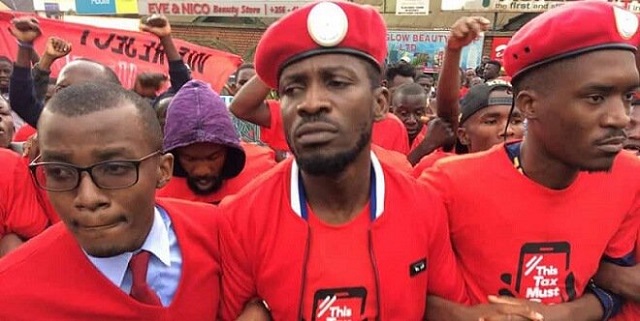
While Washington turns a blind eye, autocrats across the continent are muzzling their citizens online
Kampala, Uganda | HILARY MATFESS & JEFFREY SMITH | In August 2017, during a new media roundtable between leaders from China and Tanzania, the Tanzanian deputy communications minister praised the Beijing government for blocking social media platforms in China and replacing them with “homegrown sites that are safe, constructive, and popular.” The Tanzanian minister lamented that his country was not there yet.
Less than one year later, a number of popular Tanzanian websites that had been critical of the government were taken down in June to avoid hefty fines imposed as a result of the country’s new internet regulations that were passed in March. The new laws, including similar ones imposed effective July 01 in Uganda, are the latest in a long and troubling succession of restrictive measures enacted across Africa to muzzle free speech and dissenting political views.
Tanzania and Uganda are the latest nations to fall victim to a wave of internet censorship that has been inspired and exported by autocratic powers such as China and Russia, as well as totalitarian regimes like North Korea. These restrictions are often implemented under the guise of public order and security. These days, abusive leaders with authoritarian tendencies are no longer compelled to rely heavily on baton-wielding security forces and brute violence to entrench their personal power and prevent criticism. This “rule by law” method, popularised by Vladimir Putin’s regime in Russia, allows leaders to manipulate legal processes for their own purposes while avoiding the international condemnation that typically comes with images of brutality.
In recent days, Uganda has seen protests against a social media tax of Shs200 (US5 cents) per day that would, in the words of President Yoweri Museveni, put an end to “gossip.” His real objective, it seems, is to muzzle dissenting voices. Both the unrest and the government’s harsh response to criticism (which included firing tear gas and live rounds at demonstrators) suggest that the current governance of the internet and technology is not only itself anti-democratic but might also facilitate other anti-democratic practices.
It’s not surprising that elites feel threatened. After all, vibrant social media platforms, a critical and unflinching press, and free expression have the potential to level the political playing field. Entrenched African leaders such as Museveni — who has been in power for 32 years — are exploring new methods to block opposition forces and halt political mobilisation.
The Tanzanian and Ugandan governments demonstrate that illiberal governments will go to great lengths to restrict speech in the digital realm. By doing so, they are strengthening negative norms and landing a formidable counterpunch to the once perceived inevitability of online mobilisation and the widening of democratic space. No amount of technological innovation will stop anti-democratic governments from co-opting and manipulating the internet to entrench their power.
When legal restrictions — and old-fashioned economic intimidation — have failed to muzzle dissent and popular mobilisation, governments have turned to more extreme methods: internet shutdowns. From January 2016 to December 2017, the internet advocacy group Access Now documented more than 180 such instances worldwide, including a 93-day blackout in Cameroon, the longest recorded over this time period. Importantly, these assaults on basic human rights do not occur in isolation and often form part of a broader campaign against freedom and democratic principles. The concept of internet sovereignty, promoted by autocratic states such as China and Turkey, means that the web is now a censored spigot that can be turned on and off at the government’s discretion. China, for example, moved this year to ban virtual private networks (VPNs), which are often used to circumvent government censorship of the internet; in 2017, it was reported that the government had demonstrated the ability to intercept and delete images being sent electronically in one-to-one chats. Turkish President Recep Tayyip Erdogan called Twitter a scourge and promised to eradicate it at a rally in 2013; since then, his government has overseen multiple suspensions of access to social media sites and prosecuted citizens for political speech online.
Across sub-Saharan Africa, free expression is being unjustly curtailed, and the internet is increasingly being used by authorities to censor and surveil citizens, often with a focus on independent journalists, civic activists, and vocal opposition leaders who are seen as threats to the government. This sort of manipulation presents a clear threat to democratic values by constraining the internet’s potential to act as a virtual public square and by preventing the rise of a robust digital fourth estate.
There was a time when democracy activists in these countries could have expected backing from Washington. But despite mounting evidence of authoritarian regimes flexing their collective muscle online, the United States has been asleep at the wheel. The U.S. government — under both Democratic and Republican administrations — has traditionally been a global standard-bearer for freedom of expression. Today, Washington’s failure to speak out and stand up for internet freedom has global consequences.
In addition to the harsh new laws in Uganda and Tanzania, Zambia also now requires WhatsApp and Facebook group administrators to register with the government — and is threatening to punish users for promoting what it calls “false information.”
In Zimbabwe, a new Ministry of Cybersecurity, Threat Detection, and Mitigation — reminiscent of the North Korean model — will focus on eliminating “abuse and unlawful conduct” in cyberspace like a “trap used to catch rats,” according to a government spokesperson. At a time when the country may be at a democratic inflection point, the continuation of such policies under President Emmerson Mnangagwa suggests that the anti-democratic tendencies developed under deposed President Robert Mugabe could undermine the country’s democratic transition. This anti-democratic initiative revealed that Mnangagwa is not so different from Mugabe when it comes to curtailing freedom of speech.
Source: FP magazine
 The Independent Uganda: You get the Truth we Pay the Price
The Independent Uganda: You get the Truth we Pay the Price





